Illinois Issues: Refugees Seek A Haven In Troubled Times
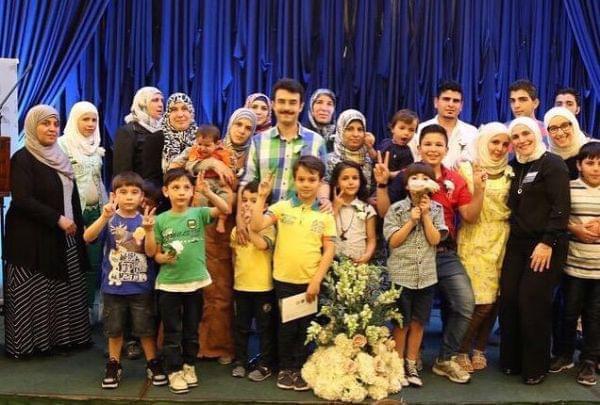
Chicago area Syrian refugees gather for a group picture at a Syrian Community Network event honoring World Refugee Day in June. Syrian Community Network
Historically, Illinois has been a leading state in refugee resettlement, but lately it seems less welcoming to some.
Ed Silverman says he thought for sure he had lost his job. The populist Democratic governor who hired him fell short in his re-election bid and was replaced by a tall, folksy Republican.
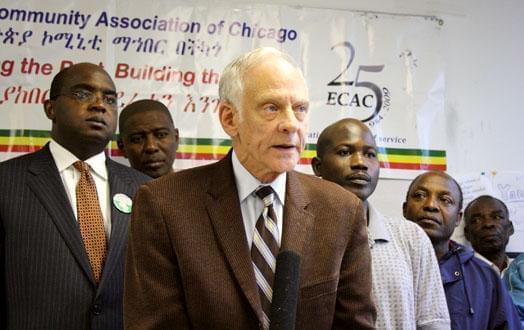
Ed Silverman retired in 2014 after working nearly 40 years as the state's director of the Bureau of Refugee and Immigrant Services.
That new governor was James R. Thompson. It was 1977. Silverman’s agency — one that looked out for the needs of Asian Americans — was in danger for a time. But Silverman found a champion in a high-ranking official in the Thompson administration who happened to be a Latvian immigrant. And the office, which would eventually be called the Bureau of Refugee and Immigrant Services, was saved.
Eskinder Negash, a senior vice president of the U.S. Committee for Refugees and Immigrants, says Silverman, who retired from the Bureau in April 2014, is known as “the dean” of U.S. resettlement.
Negash says Illinois is considered a leader not so much for the sheer number of refugees that have resettled here — more than 124,500 from 86 countries over four decades — but in the creation and coordination of national partnerships and support and connection of settlement organizations in this state.
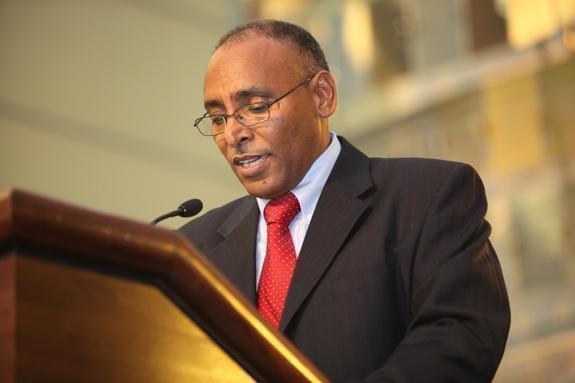
Eskinder Negash is a senior vice president of the U.S. Committee for Refugees and Immigrants. He calls Ed Silverman the dean of U.S. refugee resettlement.
“Illinois has a long, long history not just of welcoming refugees but in also providing leadership nationally for modeling refugee resettlement,” says Fred Tsao, senior policy counsel for the Illinois Coalition for Refugee and Immigrant Rights.
But Illinois’ leadership drive seemed to come screeching to a halt when Gov. Bruce Rauner joined about 30 mostly Republican governors who said they didn’t plan on letting Syrians, who are fleeing a civil war, come to their states without greater examination. “This positioning by Gov. Rauner is a significant break,’’ Tsao says. “We’re talking about a break from what has been the stance of the state for the last four decades.”
That it happened in this state, Silverman says, makes it particularly troubling. “The ignorance is especially painful in Illinois because we have had a century and a half history of welcoming immigrants by both Democratic and Republican governors.”
Rauner and the other governors who objected to Syrian refugees have no say in which refugees come to their states — in fact, 32 Syrian immigrants have found a haven in Illinois since mid-November when ISIS-supported terrorists attacked Paris, which sparked the governors’ comments. But the congruous stance of more than half the governors in the United States is a sign of the dwindling bipartisan support for foreign-born people who are fleeing horrors in their home countries.
The Republican-majority U.S. House in November approved a resolution to add more scrutiny to the already expanded review of Syrian refugees and, of Iraqis, as well. The Senate never considered the measure, the SAFE Act. Supporters voiced concerns about members of ISIS gaining entry into the country disguised as refugees and carrying out attacks.
Republican U.S. Rep. John Shimkus of Collinsville, who was one of the sponsors of the act, says it’s about basic security. “We are just asking our top intelligence people to certify [to Congress] that these individuals are not a threat. Is that too much to ask? Especially when we have look at Paris, France. San Bernardino. The country is more at risk and more threatened today.”
Republican presidential candidates have had damning words about Syrian refugees, most notably Donald Trump, who called for an outright block on the entrance of Syrians to the U.S. In December, Trump released this statement: “Until we are able to determine and understand this problem and the dangerous threat it poses, our country cannot be the victims of horrendous attacks by people that believe only in jihad, and have no sense of reason or respect for human life.”
“You have a range of demagogues selling a bunch of horse manure, feeding ignorance, prejudice,” Silverman says.
He says governors claiming they want to “shut off Syrian resettlement” despite lacking the authority, shows that “they don’t understand the refugee program itself, how it operates who operates it and what the results have been.”
For the refugees themselves it is all too real. In calendar year 2015, more than 2,600 of them came to Illinois — mainly from African countries such as the Democratic Republic of Congo and Sudan. Several other of the countries were in the Middle East, including Iraq and Syria. The greatest number of Illinois refugees in 2015 came from Myanmar, formerly Burma. In 2105, 978 people came from the Southeast Asian country to Illinois.
Among the 196 Syrian refugees who have come to Illinois since the war in Syria began five years ago, is Dr. F. Jawish. He fled as President Bashar al-Assad was bombing his own people. “It’s my country. I like my country, but I don’t like Assad’s regime because there is no freedom of speech, no freedom of anything. Anyone can’t speak up. They will detain him or kill him,” he says.
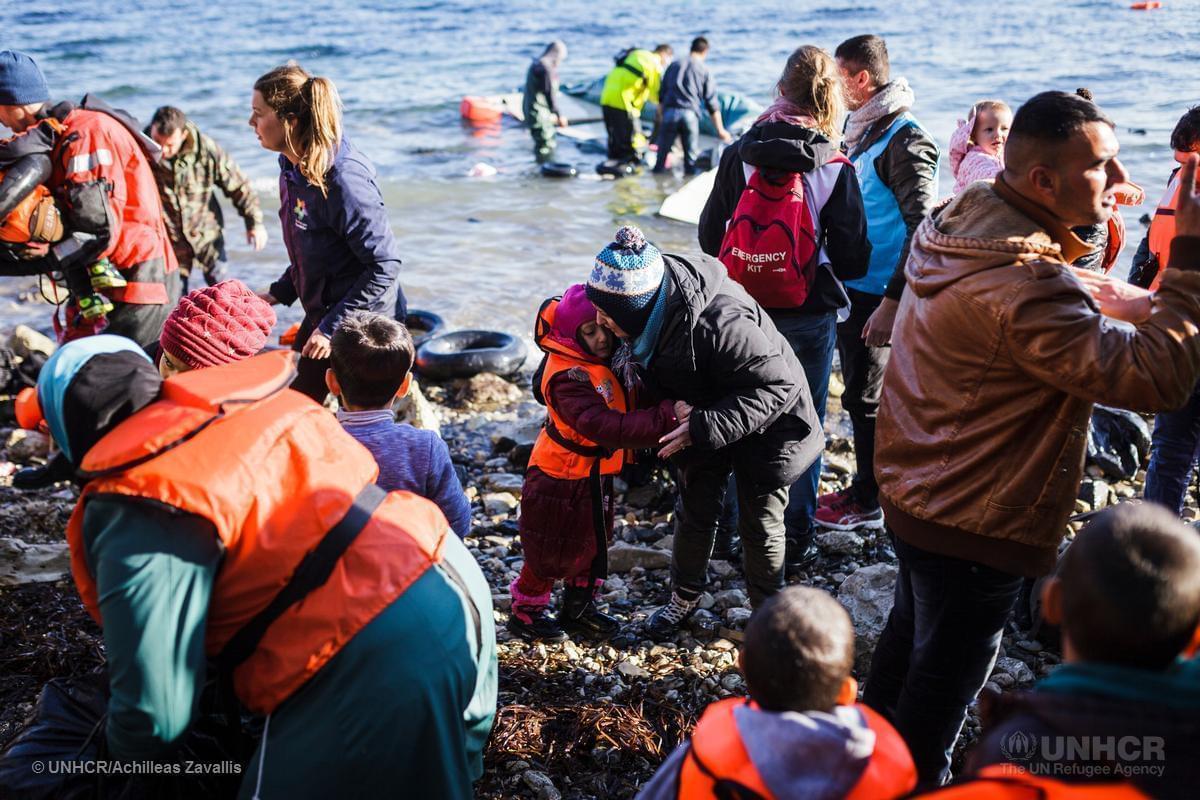
Credit © UNHCR/Achilleas Zavallis / U.N. High Commission on Refugees
Since its 2011 start, the war has displaced more than 6.5 million Syrians within that country, and another 4.5 million have escaped to other nations, including the 2,754 that have come to the United States.
For many older Americans, it brings to mind another great wave of migration — one that started in Vietnam with the 1975 communist takeover. Eventually, over two decades or so, about 2 million refugees escaped Vietnam, Laos and Cambodia. Many in that exodus came by small fishing boats, which is evocative of the Syrian crisis today in Europe. The United Nations forced other countries in the region to take in refugees after the Vietnam War. There was no such force placed on the United States, which took in 125,000 Southeast Asian immigrants after American soldiers left the region with the fall of Saigon. The Southeast Asians left home fearing for their lives, as Jawish did. Among those who fled was Ngoan Le, Silverman’s successor at the Bureau of Refugee and Immigrant Services.
She retured a call from Illinois Issues, but said she had to refer questions to a spokeswoman for the Department of Human Services. Then, she declined under the advice of a communications director for the department, to speak of her own experience as a refugee. So there is no way for readers to learn how her experience may have mirrored that of Jawish and other present-day refugees.
Jawish, an anesthesiologist, asked that his full name not be used in this story, explaining: “The regime will hurt my mother. She is still there.” He says, “They killed actually a lot of people, even one of my friends … They killed him because he helped in his neighborhood. He helped people [who were] injured.”
Granted refugee status by the U.N. High Commission for Refugees because he had been tortured by the Assad regime, Jawish had come to Chicago in September, in time to hear Rauner’s comments.
“I’m really sorry about that because … we never, never liked ISIS from the beginning,” he says. “Islam states you cannot hurt anybody else. You cannot kill anybody else. If you do, then it would be like hurting everyone else. It would be hurting humanity. In the Koran, the holy Koran, you cannot hurt people.”
He says one of the things he would like to tell the governor if he had the chance is that he is grateful to the organizations that have helped him. They include his resettlement agency, Catholic Charities. The nonprofit has worked with about seven Syrian families in the past few years, says Kristine Kappel, director of communications for Catholic Charities of the Archdiocese of Chicago, one of the 10 major resettlement agencies in the state. Jawish says he is also grateful for the Syrian Community Network, a Chicagoland volunteer organization established about a year ago to assist the growing incoming number of refugees coming to the area.
“Refugees are victims. They’re victims of terrorism; they’re victims of violence,” says Suzanne Akhras Sahloul, the executive director of the Syrian Community Network, which is working with about 25 refugee families in the Chicago area. “They’re victims of torture. They’re victims of war. For us to now blame the victim is really shameful, and I think Gov. Rauner was too hasty in his remarks.’’
In response to the question of how the governor would reply to concerns about ending a tradition of refugee support in the state, spokeswoman Catherine Kelly wrote:
“Gov. Rauner believes we need to preserve our heritage as a state welcoming of refugees while addressing the all-too-real security concerns that continue to evolve every day.
“We have repeatedly asked the federal government for briefings on the refugees being resettled in Illinois, but it says it has no mechanism to coordinate with state governments. We believe this is a reasonable and responsible request to ensure we maintain a balance between compassion for refugees and security for our citizens. ”
Akhras Sahloul says Rauner should meet some of the refugees coming to Illinois. “I’d like to invite him to visit some families and sit down and have tea. He would hear the stories of the families, and the children and their struggles. I think he will have a change of heart.”
She says if she could, she would introduce him to a 14-year-old girl “who still has shrapnel in her [back] from when her home was shelled. If he would just listen to her story of how she managed to escape, how her family managed to escape… I believe he would start to make a shift in his policy and a shift in his rhetoric.”
Silverman doesn’t sound as optimistic. “I think that Gov. Rauner in particular has treated this, like some the other governors, like a kind of political statement without any background of the people.”
A long string of federal agencies are involved with screening refugees, including the National Counterterrorism Center, the F.B.I., the Defense Department, the State Department and U.S. Customs and Border Protection. Those agencies do a variety screenings, which include biographical, criminal, physical and biometric, such as iris scans and fingerprints.
Then, Syrians go through extra checks by the Department of Homeland Security and additional lines of questioning. [Click here to see a link to the screening process for refugees.] “The most blatant lie is that refugees come without any background check, which is ridiculous, the screening process is 18-months to two years and sometimes longer,” says Silverman.
Despite this process, Tsao says of those who fear for the nation’s safety because of refugees: “The individuals who are most vulnerable and most in need of assistance are the ones who are being turned away under the false perception they are a threat in themselves.’’
Jawish was presumed to be a threat by the Assad government, which he says tortured him and held him captive for almost a year because he gave medical treatment to neighbors injured in bombings. “They threatened me. I know that [but] I cannot leave my neighbors injured without helping,” Jawish says. “That’s my duty. My job. I’m a doctor. I have to help. They are my neighbors. And they are innocent people. They did nothing. … So I had actually to help. I had to help. I had no other choice. I had to help.”
Jawish was detained in Damascus in an underground space so small not all of the men there could stand at one time. They were given very little food. “Not even enough for a baby.” There he was tortured seven times: beaten with a water pipe on his head, legs and back. Others, he says, were beaten more frequently. He indicates that perhaps the worst part for him was watching men die. They were given no medical treatment, no medication.
Once Jawish was released, he, his wife and their 3-year-old son fled, like millions of other Syrians. The family went first to Turkey, where their refugee process began, in 2013. They are among the lucky ones.
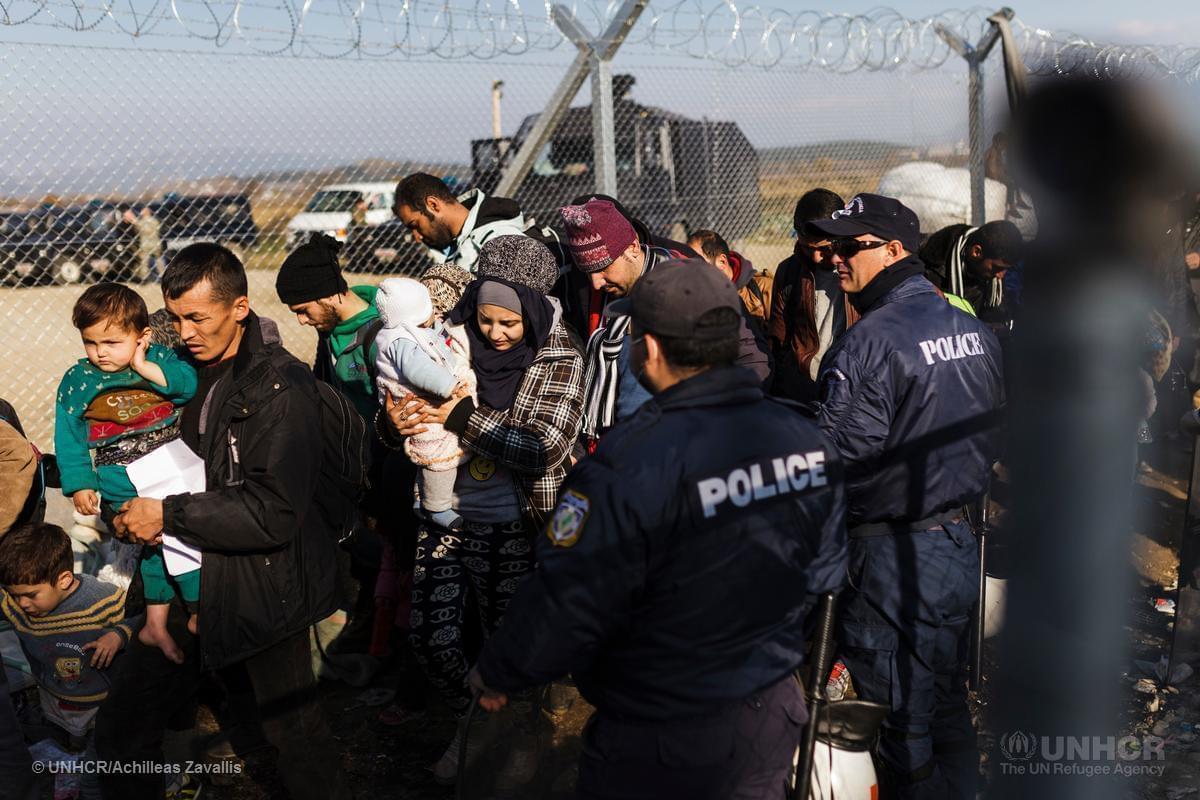
Refugees from Afghanistan, Iraq and Syria wait near the Idomeni transit station to cross the border from Greece into the former Yugoslav Republic of Macedonia.
Credit U.N. High Commission on Refugees
“There are 16 million registered refugees, and only one half of 1 percent receive third country resettlement, says Audrey Lumley-Sapanski, associate director of resettlement and placement for the Heartland Alliance, which resettles about 320 refugees annually, including 27 Syrians since October.
“The pipeline is so slow. We’re still getting east Africans — and I’m not exaggerating — who’ve been in camps for 20-30 years, and so while the Syrian crisis is certainly horrible, it’s just more recent. It takes a long time to get things up and going.”
The process is so restrictive that David Miliband, head of the International Rescue Committee, told the New York Times last month that the odds of winning the Powerball are probably greater than experiencing resettlement in the United States.
The effort to make the process even more daunting is troubling many in the refugee support business. They include Silverman, who is distressed that nationally bipartisan, broad support of refugees that he saw during the Vietnam era has ended. So far, statements, such as Trump’s call to ban all Muslim refugees from entering the country, do not appear to be politically damaging for the elected officials and candidates making them. “It struck a chord as soon as Trump hit it,” says John Jackson, a political scientist with the Paul Simon Public Policy Institute of Southern Illinois University.
Some of that is a clearly result of terrorism. As Jackson says, “I think 9/11 raised the level of paranoia in this country materially.” Economic uncertainty and animosity toward illegal immigration are also factors.
Silverman sees that point, and chalks much of that anti-refugee sentiment up to lack of knowledge. “There is total ignorance about the nature of Islam — real values of Islam. The fact that Islam rose out of the same roots as the Judeo-Christian theology. The other issue is that, because of 9/11 and demagoguery that follows, people think that all Muslims are Arabs, which is ridiculous.” He notes that the Council of Islamic Organizations of Greater Chicago has representatives from 37 different countries.
“Part of the problem is the vast majority of the American public has lost its awareness of immigration, the struggles that immigrants go through or assets that immigrants provide,” Silverman says. “Because people have lost their understanding of immigration, they’ve lost the distinction between illegal immigration or undocumented immigration or legal immigration and refugees.”
He notes that several Midwestern cities — Detroit, Cleveland and Des Moines — have lost large chunks of population over the last 15 years. But Illinois has not had shrinking numbers even with the departure of 2 million or more natives. “Why? They’ve been replaced by immigrants.” He says that in addition to roughly 3,000 refugees a year, the state generally gets 35,000 to 40,000 legal immigrants annually.
“So who are these people? They are sustaining the labor market. They’re taxpayers. They’re consumers. They contribute to the economic and cultural fabric of society. And when they’re not there, you get situations like Detroit and Cleveland, and then have diminished economic capacity.”
Lumley-Sapanski of Heartland Alliance says volunteer and donor support seems to have actually increased in response to some of the negative buzz about refugees. “In fact, we’ve seen a lot of people reach out to us in sort of these moments when it’s been unstable or dark.”
While the current anti-refugee rhetoric may not be doing much to change policies, it is coloring refugees’ perceptions of the United States and what kind of reception they might get if they come here.
“In interviews, they’re expressing that their families don’t want to come here,” Lumley-Sapanski says. “That they’re choosing other nations to resettle at because they are worried about what the backlash will be if they come here.”
Illinois Issues is in-depth reporting and analysis that takes you beyond the headlines to provide a deeper understanding of our state. Illinois Issues is produced by NPR Illinois in Springfield.
